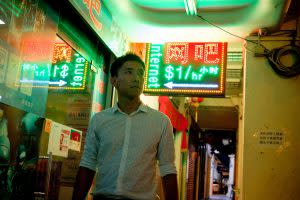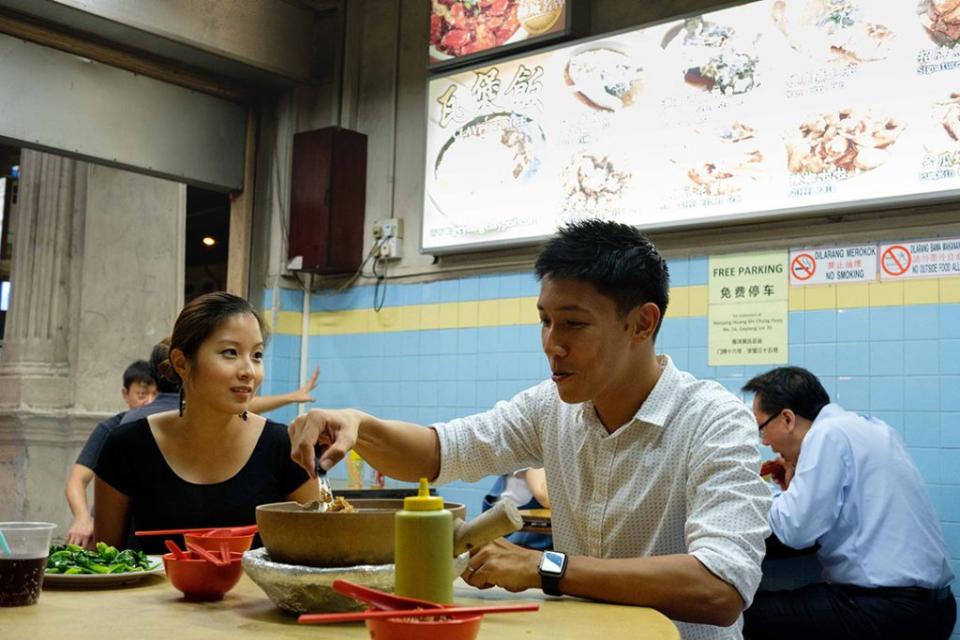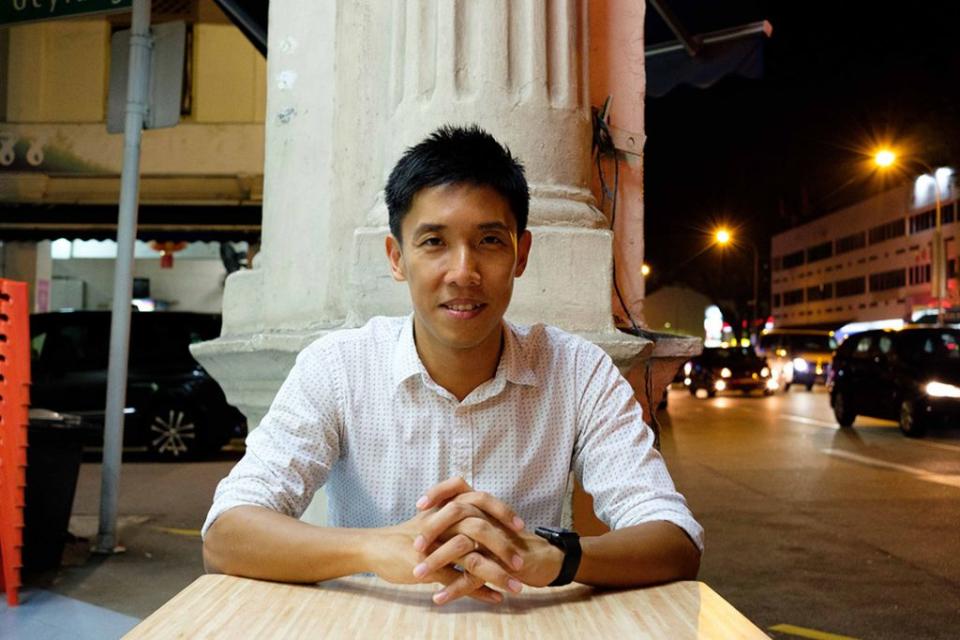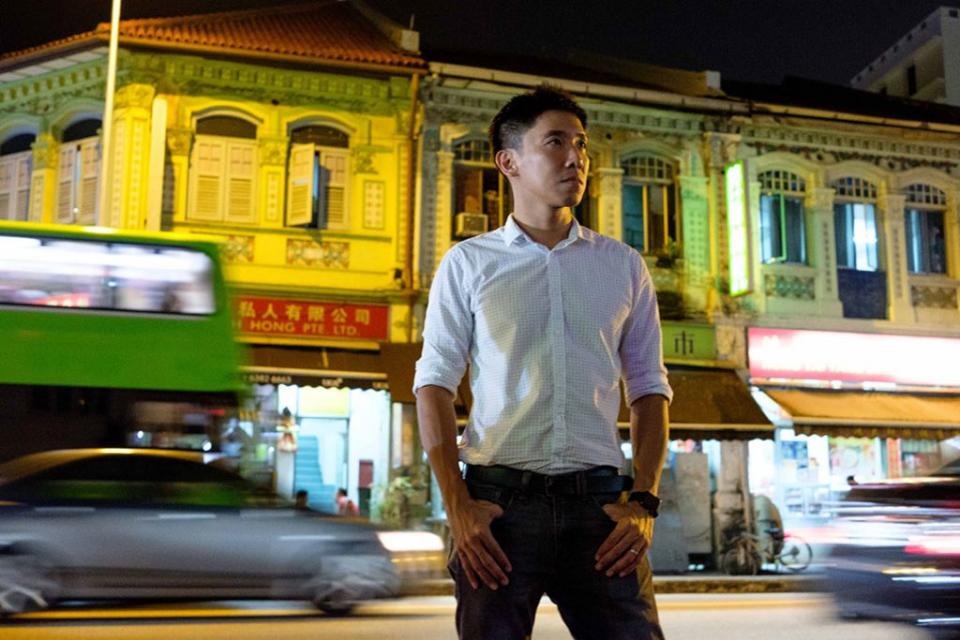9:15pm in Geylang: A Union Leader Tells Us How To Fix Our Education System

David Tay has never eaten at Geylang before. So when I suggest the idea of meeting there for dinner, his eyes light up immediately. “Let’s do it, I’m curious to see what it’s like.” To be honest, I was half-expecting him to turn down my suggestion in favour of a place that is more “sanitised”. But David doesn’t mind the grit, thankfully, and my objective of bringing him out of his comfort zone for a more informal chat is going according to plan. I meet David and his wife at the famous Geylang Claypot Rice eatery at Lorong 33. He jokes that Sue is here to keep a watch on him in the notorious red light district. “Meeting two other guys here sounds a bit suspicious,” he laughs. The 30-minute food preparation time leaves us with ample time to discuss David’s work in the National Trades Union Congress (NTUC).

David, with his wife, Sue. At 35 years old, David is one of the rising stars in the country’s labour movement (LM). He first caught the eye of NTUC while running a student-operated cafe at the National University of Singapore as a business undergraduate, and was handpicked to be one of the founding members of the organisation’s youth membership arm nEbO. Six years ago, he was already a young teacher serving on the Central Council Member on the Singapore Teachers’ Union, and concurrently the chairperson of Young NTUC, the organisation’s youth wing. Today, while serving in his new role as teaching specialist and schools correspondent at one of the largest media organisations in Singapore, David is also a member of the Creative and Media Publishing Union (CMPU). The union looks after the interests and work benefits of professionals in the creative and media publishing field, including journalists, in Singapore. David tells me about how CMPU recently worked with NTUC to organise a networking session for those who were looking for work opportunities in the media industry. Through NTUC’s extensive network, they lined up LinkedIn to assist attendees who needed help to spruce up their profiles, and recruiting firm Korn Ferry to provide coaching and employers looking to hire. Also present were a number of fellow journalists who had just been retrenched. The networking session was a wake-up call to those who had felt disgruntled about their situation. “We showed them that there were job opportunities in new media industries that they could capitalise on. But in order to do that, they needed to retrain themselves first,” says David. “Instead of just writing stories, they would need to learn how to splice videos together or make sense of analytics to create an infographic. “I could see their eyes widen after we showed them the possibilities and what they needed to do.” This is the key difference that the union makes, David emphasises. It’s not just about helping workers negotiate for better pay and benefits, which is a simplistic summary of what the LM in Singapore does. Rather, the objective of the LM, as a progressive organisation, is to enable workers to thrive in a changing economy by helping them understand why they need to grow, which in turn builds a stronger workforce for the country. To achieve that, David says, Singaporeans must fundamentally understand the importance of continual learning.

Dinner is finally served, and David is also learning something new here. “Oh it comes in one big claypot!” he exclaims, as he expects our claypot rice to arrive in individual bowls. David’s dedication to the LM cause may come off as a little austere when he discusses his work, but his lighter side reveals itself as we dig in. “I’m going to look so hungry and greedy in the photos with four bowls in front of me,” he laughs, as my colleague snaps a few shots of him scooping the piping hot rice mixed with dark soy sauce and topped with chicken and sausage. Our dinner meeting comes a day after NTUC’s biennial Ordinary Delegates Conference and LM Conversations, where “continual learning” was one of the buzzwords of the day. The organisation announced that it would be developing “bite-sized workshops” as well as mobile “just in time learning” to ensure that all workers can be equipped with new skills continually and quickly. For this to be effective, workers first have to be sincere about upgrading themselves. Unfortunately, however, there is still a misconception about what continual learning should entail. “Many workers think that upgrading their skills and knowledge warrant a salary raise or promotion. That should not be the case,” laments David. “Instead, we should think in terms of learning skills to future proof ourselves, how to make ourselves relevant even when jobs are transformed. And when you learn skills that you are genuinely interested in, you are more likely to excel in it. The tangible rewards usually naturally follow.”

David compares our society to Finland’s, which holds an entirely different attitude towards lifelong learning. “During a work trip there, a Finnish man told me that he was learning how to juggle. You would probably be ridiculed here in Singapore for learning a skill like this that seems ‘useless’. But the Finnish people take so much pride in what they do, and they genuinely want to be good at the next skill that they learn. “It’s not the perfect country, but this is something that we can definitely emulate.” I ask David what he is currently learning outside of work. He has just recently picked up golf, which he plays frequently. To improve his skills, he has even driven up to a golf course in Johor. The self-proclaimed gadget geek is also pursuing a hobby in drone photography. Singaporeans’ obsession with KPI, results and competition is so entrenched today, and stems from an innate dilemma in the country’s education system that reinforces this mentality. Being a former teacher himself, David knows the problems all too well. He recalls having to continually convince his students why they had to learn computer coding, or even do a class project well, when they were not examinable. Many Singaporeans would be quick to point the finger at the deep-seated problem of an education system that is too focused on grades, which has also led to how employers tend to hire workers based on paper qualifications alone – a point which was raised by Minister for Education (Higher Education and Skills) Ong Ye Kung. Hence, there is an urgent need to rethink how we distill education so that our workforce would be properly transformed for the future. In order for this to happen, everyone from teachers, students, parents and even employers will need to accept responsibility. Instead of just relying on educators and the Ministry of Education to take the lead, we will all need to play our part in cultivating a real love for learning in our children and future generations. David visibly becomes more passionate and agitated at the same time when discussing the role of education in Singapore, an issue that is very close to his heart. “How we teach children to learn in schools will have a huge impact on how they work and live when they grow up,” he says. But it would take a monumental shift to change society’s attitudes towards educational reform, especially when the system is one of the best in the world (Singapore was ranked first in the world in the latest Pisa tests) and has already worked for many Singaporeans. Convincing everyone to leave an established system behind for a new one would not be easy, but it is the only way for our society to progress In fact, David’s sentiment was just reiterated at the LM Conversations. In response to a question on how education could become less books-heavy, Minister for Education (Schools) Ng Chee Meng said: “[MOE] is trying very hard to reduce the over-emphasis on academics and promote the intrinsic joy of learning that is needed for lifelong learning, whether you are a student or worker. We want to get our kids out of the classroom and apply their skills so that they can keep that unique philosophy of exploring and discovering, and hopefully they can create value for our economy and create more job opportunities for Singapore. “But I’ll need all the parents to partner MOE on this new venture. We are no longer talking about grades. Grades is just a piece of paper and it’s not the most important any more. Applying skills and knowledge is most crucial in the new economy.”

We still have appetite for a second meal, so I suggest heading over to another famous haunt of supper-craving Singaporeans – Eminent Frog Porridge. David looks a little uneasy. “Do we really have to?” Turns out he likes frogs, and cannot bear the thought of eating one that has been “smiling” in a tank waiting to be cooked. Still, he relents, because he will not pass up the offer to eat good meat. The frog leg porridge stall is seven streets away on the other end of Geylang road, a perfect opportunity for David to soak in the sights of Geylang’s nightlife. It’s pretty quiet on this night, which he also observes. I reply that police patrols could have sent most into hiding, and that piques his curiosity even more. Along the way, David asks many questions about the shops and buildings in the area, occasionally pointing to a hotel and asking if it is a hotspot for vice. I joke that the only way to find out is to go inside. Fortunately, Sue is still by his side. The post 9:15pm in Geylang: A Union Leader Tells Us How To Fix Our Education System appeared first on RICE.



